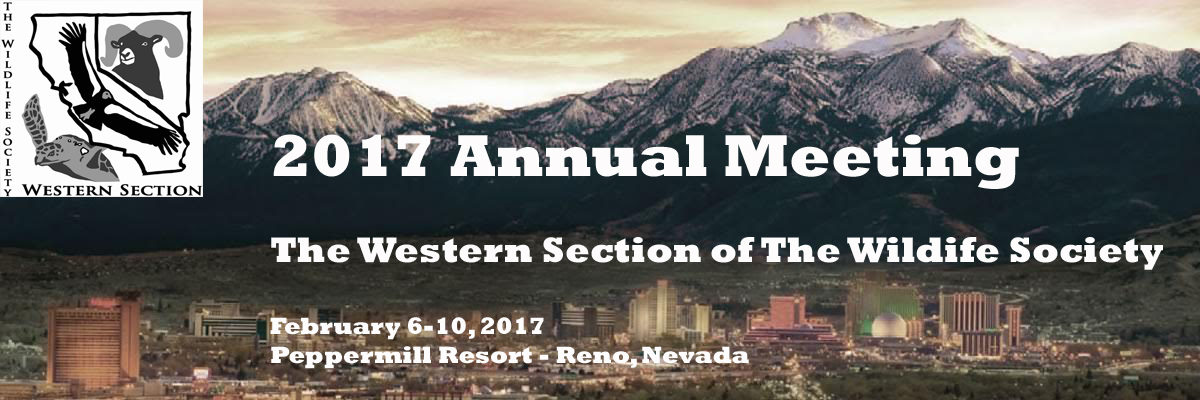Plenary Session and Keynote Address
Plenary Session
Invasive Species: Globalization and bad decisions
While the causes and consequences of species invasions have attained high visibility within the past few decades, they have long been a negative transformative agent for wildlife communities and habitats within the area encompassed by the Western Section of TWS. Species invasions began in California and Nevada with the transformation of vegetation communities by invasive grasses and weeds unwittingly brought to California by colonizing Spaniards in the 17th century. Mosquitoes were introduced to Hawaii in about 1826 and have served as hosts for malarial parasites that have subsequently decimated endemic Hawaiian birds. World War II likely led to the introduction of brown snakes to Guam that have subsequently eliminated or reduced many species there. Yet these initial waves of invasion will not be the last because they continue today in various ways. In our conference theme we use the word “globalization” in a general sense to mean anything related to the movement of potentially invasive species as a consequence of human movement (accidents), commerce, and nostalgia (purposeful introductions). Invasions are also often the result of bad decisions whether they were well-intentioned decisions or simply ill-conceived. “Bad decisions” clearly overlap decisions related to commerce as well as purposeful decisions that result directly in negative invasions. Ironically, the wildlife profession has often been at the forefront of purposeful introductions of potentially invasive species in an attempt to “improve” hunting opportunities and wildlife habitat. In keeping with a broad vision about our theme, invasive plants, issues of public policy, and laws are relevant topics. The former because invasive plants can affect habitats upon which wildlife depend and policy decisions and laws affect the ease by which invasive species persist or enter the country and whether we do anything about them once they are here (e.g., de facto protection of wild pigs in California and protection of wild horses and burros on public lands).
Plenary sessions within conferences usually follow a standard format of speaker (or set of speakers) giving an oral presentation. We will use a different, novel format for our plenary session – a conversation between experts working in conservation and with invasive species. Our two exceptional individuals will engage in a wide-ranging conversation about invasive species. Each interlocutor brings a unique perspective to discuss invasive species. One interlocutor has an extensive academic, theoretical, and conservation background in invasive species biology and the other confronts species invasions on islands throughout the world.
One interlocutor is Dr. Daniel Simberloff. Dr. Simberloff is the Nancy Gore Hunger Professor of Environmental Science at the University of Tennessee, Knoxville. He received his PhD from Harvard University in 1969 working with Dr. Edward O. Wilson. Dr. Simberloff has had an extraordinarily productive career publishing nearly 500 papers. Many of his papers have been seminal works in their fields and have provided new theory or challenges to current ideas in ecology. He has been a leader in the study of invasion biology making contributions to the presidential Executive order 13112 on invasive species, serving on the IUCN Invasive Species Specialist Group, serving as current editor of the Journal of Biological Invasions, and recently publishing a book on the subject – Invasive Species: what everyone needs to know. He has also served on the National Board of Governors of The Nature Conservancy, the federal Invasive Species Advisory Committee, and several editorial boards of international journals. Among his many honors, he was named Eminent Ecologist by the Ecological Society of America in 2006, received the Ramon Margalef Prize in Ecology in 2012, and was elected to the National Academy of Sciences in 2012.
Dr. Karen Poiani
Our second interlocutor is Dr. Karen Poiani. Dr. Poiani is Chief Executive Officer of Island Conservation, Santa Cruz, California. She received her PhD from Virginia Polytechnic Institute and State University in 1990. Dr. Poiani’s career has been centered primarily within the nongovernmental sphere of conservation. Prior to her joining Island Conservation, Dr. Poiani was the Director of Evaluation and Learning for the Gordon and Betty Moore Foundation. Before that she had a long association with The Nature Conservancy holding numerous leadership positions within the organization such as Chief Conservation Strategy Officer, member of the Global Executive Team, Director of Science, Director of Conservation Learning, Director of Conservation Programs (Hawaii State Chapter), and senior Conservation Ecologist (Asia Pacific Program). In addition, she was principle of her own consulting firm, Karen Poiani Consulting. She has been a leader and mentor to women working in conservation (e.g., leading strategic planning for Women’s Environmental Network Board, SF Bay Area).
_______________________________
The 2017 Keynote Address 
- Wednesday, 10:00am to 12:00pm


